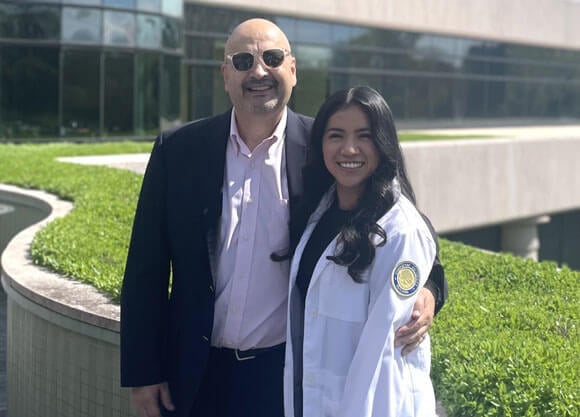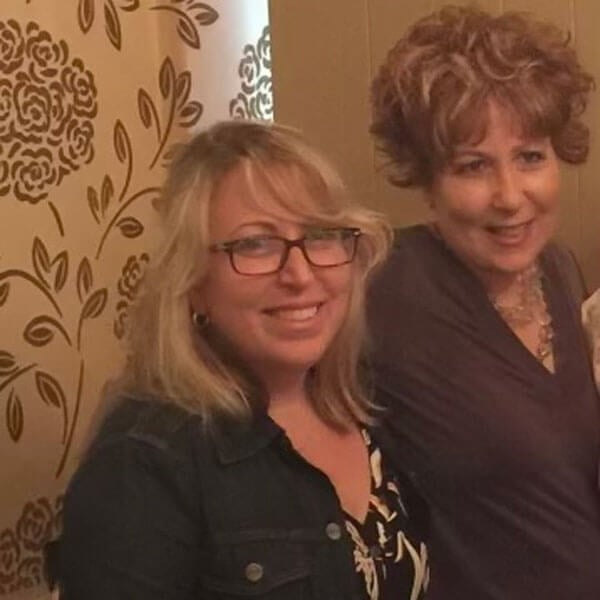
Second-generation nurse practitioner graduate students follow in alumni parents’ footsteps
May 29, 2024

May 29, 2024

Both of Perpetua’s parents are School of Nursing nurse practitioner alumni, including mom Vicki Amon-Perpetua '05 and dad Ron Perpetua '15.
Angel Rentas ’03, father of Coralyn Rentas, earned his degree in the early days of the program, as did Mary Ellen Baldino '04, who undertook her graduate studies when her daughter, Liz, was a teen.
Adding to this full-circle story, Quinnipiac Director of Primary Care Nurse Practitioner Programs, and chair of Graduate Nursing, Laima Karosas, has been an educational constant. Karosas has been with the school as a clinical professor of nursing since 2002. Quinnipiac launched its first MSN nurse practitioner program tracks in 1998.
Karosas shared the exciting news of the School of Nursing’s three Bobcat second-generation connections during the online cohort’s Class of 2025 White Coat ceremony. She said the alumni family members and their children do much to represent the School of Nursing’s throughline of excellence and involvement.
“All of the parents were really great students who were very driven and very involved, and their children are, too,” said Karosas.
One of the strengths of the program is its alumni involvement, Karosas said.
“Our alumni stay connected. Angel, who was in my first class, was our keynote speaker at our conference this year,” Karosas said. “Liz’s mother has been precepting for us for years, and Viki has been one of our site visitors for students in clinical practice.”

In addition to providing clinical site visits, Amon-Perpetua taught at Quinnipiac as an undergraduate clinical adjunct instructor with the School of Nursing. She is currently an APRN in cardiovascular disease with Yale-New Haven Hospital.
Ron Perpetua earned his Doctorate of Nursing Practice (DNP) at Quinnipiac and specializes in gerontology. He said he’s glad to know that his daughter has the same opportunity to experience the quality of education he and his wife received from the School of Nursing.
“It creates a profound sense of pride and nostalgia,” he said.
Veronica Perpetua said her family’s association with Quinnipiac go back to her early childhood.
“My mom first became a nurse in the Philippines, which is where both my parents are from. She became a nurse in the ‘90’s, and then she decided to come here to the states, where my dad eventually followed her over. I was five years old in 2005 when my mother graduated from nurse practitioner school at Quinnipiac,” Perpetua said. “I have a few visions of being in a gymnasium where they used to have the poster presentations, and there’s a picture of us at her graduation in front of the library.”
Amon-Perpetua said her nurse practitioner cohort was small, but the support provided by Quinnipiac faculty, including Karosas, was memorable and life-changing.
“I was in the program from 2002 to 2005 and there were only 10 or 11 of us during that time,” Amon-Perpetua said. “When I started teaching at Quinnipiac, we moved from the main campus in Hamden to the North Haven Campus, which is where my husband got his degree. So I know the history of the program and its very good reputation.”
The family was thrilled when Veronica decided to attend Quinnipiac for her nursing education.
“I was delighted that Veronica picked Quinnipiac, knowing how Quinnipiac provided us a good quality education,” said Amon-Perpetua. “I felt assured that my daughter is going to be a successful person and also that she’s going to get the skills that she’s going to need to prepare her to be an outstanding clinical provider.”
Now in the nursing profession for three years, Veronica Perpetua said the School of Nursing has prepared her, her mom, and her dad for their work.
“Coming out of nursing school at Quinnipiac and seeing how both my parents are with their patients, we’re very prepared,” she said. “We were all very confident in taking our exams for the boards. There’s just a lot of preparation that the school put us through. All those exams, although they were very difficult, definitely prepared us for later on in life when we’re taking care of our patients.”
Even as the program has grown, Karosas said its focus on preparing graduates to enter the profession practice-ready, with the highest standards of care, has remained the same.
“I think our program has stayed very clinically focused,” said Karosas. “I think our programs have always been competency-based. We really do want to know that the person that graduated from Quinnipiac really can take care of me and my family, that I would have no problem sending my family to you. That’s the standard of care that we want to see.”
Mary Ellen Baldino believes in helping the program to uphold its strong educational foundation, which is why she precepts students every semester and also provides some site visits for nurse practitioners.
“I’ve been doing it for years and I really enjoy it, because I really want the program to stay strong and be recognized as a good program,” said Baldino, a family nurse practitioner.
She’s also delighted that her daughter, Liz, has joined Quinnipiac’s nurse practitioner program.
“I wanted her to go to a good program; a high-quality program, so I was really excited when Liz told me she decided to go to Quinnipiac,” Baldino said. “I knew she would be getting personalization. She wasn’t going to be a number at Quinnipiac, because I wasn’t a number there. People knew me, and they knew what I was uniquely interested in.”

As a nurse of 17 years, Liz Baldino is currently an emergency department team member in Boston, Massachusetts. Last year, while completing her Master of Public Health, she had the opportunity to work with a substance abuse disorder program. From that experience, she realized wanted to become a nurse practitioner. While she was offered opportunities to enter nurse practitioner programs in the Boston area, Baldino wanted to gain the same outstanding education her mother had received at Quinnipiac.
“I wanted to go to Quinnipiac because it’s a school with a prestigious nursing program. It’s a school that I can be really proud to say I’ve graduated from,” said Baldino. “I also want my doctorate, and I’m going to probably stay at Quinnipiac for that.”
Coralyn Rentas said the qualities the School of Nursing instilled in her dad inspired her to study at Quinnipiac to earn her BSN, and to continue her education at the university to become a nurse practitioner.
“After deciding to pursue a degree in nursing when I was 16, my dad shared with me his positive experiences at Quinnipiac. At the time, I was seeking an undergraduate degree, which was different, but after hearing about the smaller classroom sizes and attentive faculty that my father valued, I realized that was also important to me and decided to move forward with Quinnipiac,” said Rentas. “When it came time to apply to graduate programs, it was an easy and quick decision to seek out a program at Quinnipiac once more, after now having my own positive experiences to reflect on as a Bobcat alumnae.”
Rentas said the ability to undertake her graduate classes online offers an exceptional advantage.
“Many of my classmates and I are balancing work, families, and school, so the ability to work on our degree online and maintain our prior obligations is unique and appreciated,” said Rentas.
Rentas said his advice to his daughter during her challenging journey to achieve her nurse practitioner degree has been simple and reassuring: “You’re exactly where you need to be.”
As a cardiology nurse practitioner, Rentas will return to Quinnipiac to provide EKG immersion content for students in his daughter’s class this August.
Karosas said students benefit greatly not only from alumni returning to share their knowledge, but from a faculty which remains embedded in the profession.
“All of our faculty that teach in our programs still do practice, and we have people with different types of practices, and I think that helps to give our students a well-rounded background and prepare them for practice,” said Karosas. “It’s a very cohesive team, and we have really great people who are strong clinicians, and that’s what makes our program good. Because we’re not talking about theory, we’re talking about what we’ve really seen in practice. What we hear from our graduates is that we really prepared them well for their first job.”
Quinnipiac Today is your source for what's happening throughout #BobcatNation. Sign up for our weekly email newsletter to be among the first to know about news, events and members of our Bobcat family who are making a positive difference in our world.
Sign Up Now